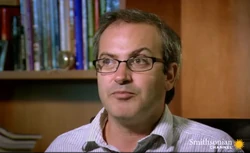
Mark Bomback
Mark Bomback is the co-writer of The Wolverine.
Quotes[]
- "My awareness of the X-Men and my interest in it sort of started with the films. I retroactively did a lot of reading of the comics and particularly the Wolverine stuff, but I wasn’t someone waiting for the day when I would get the call to work in that arena. I was really drawn to it more for the opportunity to work on that kind of film with Jim Mangold, because I knew his sensibilities and thought they were so aligned with mine that together we would find a way to tell a Wolverine story that felt true to the kind of movie we’d want to see."
- "We spent a bunch of weeks together figuring out what, ultimately, was the most novel way to reintroduce Wolverine and in a particular sort of nature that it felt part of the universe of the films that had been made, that also it was its own film. That you didn’t necessarily need the other films; that it was going to be a true standalone film for him. That it was first and foremost about who the character is, and less about how he related to the X-Men in general. And the movies we talked about were Westerns and Samurai films. Jim was really particularly obsessed with Clint Eastwood movies and how the Wolverine character has some sort of relationship to even Eastwood’s The Outlaw Josey Wales. It was very much focused on character, so that’s the approach we took from the writing of it."
- "What he might have been getting at is that there are two kinds of people that will walk into this film. There are people who have seen all of the films and come in with a lot of knowledge, and there are people who might say, “This is the first one I’ve ever seen; they never interested me until now. This is directed by the guy who directed Walk the Line, and I’m curious to see what these films are like.” So the trick when you’re writing one of these things is that you want to make sure that the people who know everything, don’t feel that they’re being retold stuff. And the people who are new to it, can follow the story. So in terms of it coming after everything, we said to ourselves, “Let’s not do this ‘Previously on Wolverine’ thing where people start talking about stuff that happened in the other film to make sure the audience has enough exposition and is caught up. Instead, the benefit of putting it after everything, is that we can actually exploit the fact that this character has been through so much. That there is such a world weariness going on, that it’s a compendium of everything he’s experienced in the other films that we don’t need to recap except to suggest that there are many people he has lost along the way, because he was built to outlast everybody else. That, to me, is why it was important to set it after everything. It’s silly to play with the idea that he’s still struggling to figure out who he is. That’s not a useful plot point anymore. Likewise, his relationship to the other characters in the X-Men and whether or not he wants to be a part of their world or not a part of their world, that’s an X-Men' problem, not a Wolverine problem. So we don’t have to deal with any of that, just focusing on what it means to experience the kind of things he has, come out the other side of it and say to yourself, “Why am I the only one still here? And, truthfully, do I still want to be here?”"
- "We kept circling around the idea of the Ronan, the Samurai who doesn’t have a master anymore. The world of X-Men in general and the need to be a hero, it gave his life purpose; it provided a structure by which even being potentially immortal, it isn’t something that isn’t going to be at the forefront of your mind, because you’re serving a greater purpose. I think once you’ve removed that sense of purpose, this thing that you have been using for good, suddenly becomes this burden. Obviously it’s an interesting problem that although nobody else in life has to worry about being immortal, but there is something universal in needing your life to have a sense of purpose. That’s the thing we both kind of locked on to: how do you create meaning for yourself when you have a certain amount of years ahead of you?"
- "That’s the spiritual question of these things and I think that’s what separates them from just being about having powers. Little kids sometimes get excited about comic book heroes because they all fantasize they would love to have powers. But I think the reason these types of characters endure and become something that even adults think about and relate to, is that they really do get at these fundamental existential things like to what extent do your gifts require you to be heroic and decent? And to what extent do those gifts sort of enable things you wouldn’t necessarily do if they weren’t given to you? Sometimes when you’re working on these things, sometimes you step back and say, “We’re talking about a guy who has claws that pop out of his fists,” and it’s such an unreality, but we’re still talking about a character. The reason that Jim was the perfect guy to tackle this is that all he comes at it with is, “Who is this character? What is broken in them that they’re trying to fix?” That’s independent of whatever genre you’re in, and the reason he works in so many different genres is that he always circles those same questions no matter what it is he’s working on."
